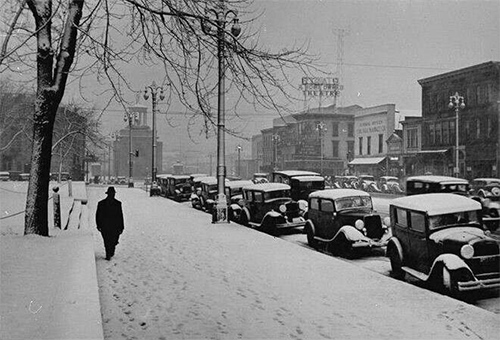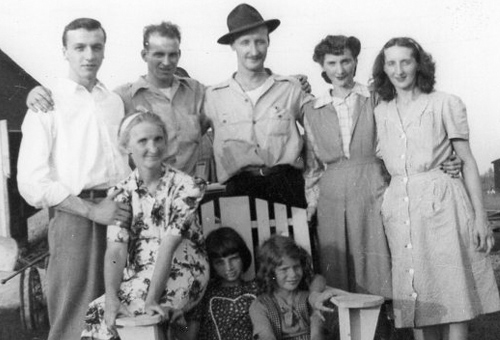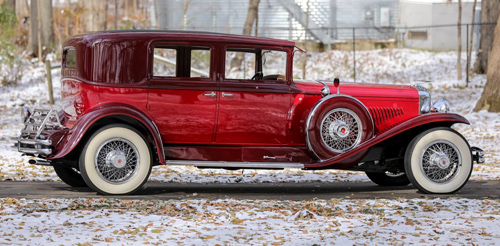|
Part 1 | 2 | 3 | 4 | 5 | 6 | 7 | 8 | 9 | 10 | 11 | 12 | 13 | 14 | 15 | 16 | 17 | 18 | 19 | 20 | 21 | 22 | 23 | 24 | 25
During the 1990s, a few years before my father, Dave, passed away in December of 2000, he wrote a 35-page autobiography. Excerpts from it will be published here, as companions to the diaries my mother, Dorothy, kept in 1945 and 1946—the year she met Dave. My dad was born in 1927, in Hamilton, Ohio. The family eventually moved to the south side of Chicago.
Part 2
Hamilton, Ohio
Mom and I are planting a tree in front of our house, within the parkway between the sidewalk and the street. I'm using a shovel to dig the hole.
After my father passed away, we moved to a small cottage at 53rd and Peoria Streets. Like our previous neighborhood, this one was Irish as well. Mom bought this new home with the $2,000 life insurance settlement. [Equivalent to $39,000 in 2020 dollars.] We were living on a small pension from my father's time working with the railroad—a railroad that played a major part in my parents' lives.

Hamilton, Ohio, in the 1930s
The story goes that the train tracks ran right behind the backyard fence of the house in Hamilton, Ohio, where mom was living with her parents. One day, in 1914, when she was hanging laundry on the clothesline, a train was chugging by, as trains often would, pouing dark smoke from its coal-powered boiler. Only this time, a chunk of black coal came sailing from somewhere on the train, landing at mother's feet. Wrapped around it was a piece of paper. It read, “May I visit you sometime?” It was signed “Michael.”
Michael was 39, and a railroad conductor. Edith, my mom, was just 16. It took some convincing for her folks to allow visits, and then a courtship, with this much older man. But they eventually gave their permission and, the following year, they tied the knot, right there in Hamilton.
During the years that followed, my siblings arrived.

Dave and his mother at the far left, with this brothers and sisters, late 1940s.
My dad was the restless type, by my mother's accounts. Young Michael and his family emigrated from Brockville, Ontario, Canada around 1890. His early years were spent on the west coast, chiefly San Francisco. During the Spanish-American War, he served with the US Navy aboard the battleship Oregon. At various times he was employed by (or possibly owned) a produce store, drove a taxi cab, and, as mentioned, was a train conductor, shuttling between Cincinnati and Chicago. While working on the railroad, he ran Kentucky moonshine to Chicago bootleggers.
After a time, my family departed Hamilton (population: 35,000) for the big city of Chicago (population: 3 million.) Once there, dad and mom operated a “truck taxi”—an open-bed, bench-lined vehicle—between the terminus of the “L”, or elevated rapid transit line, at 63rd & Stony Island Avenue, and Jackson Park Beach, at 69th Street and the lakefront. Dad drove, and mom was the ticket seller. Ten cents per person.
Prohibition was the law in these days. The only liquor one could acquire was the bootleg kind, or homemade moonshine or wine. We owned a big, Duesenberg touring sedan that had a rather large, steamer-like trunk hanging above the rear bumper. Enough space for five-gallon cans of 200 proof moonshine to be transported from Cincinnati to Chicago, where my dad's brother, Rob, disposed of the product. That is, he sold it to the Capone organization, which would bottle it for the speakeasys. Called that by the Italian speakeasy proprietors, who would ask their customers to please keep their voices down.

A Duesenberg Touring Sedan
Mom share tales of receiving fur coats, big cars, new furniture, and hefty cash deposits in the bank account. On one certain occasion, she was parking her car by a bank at 79th & Halsted Streets (at the time, nearly in the suburbs), when two men with guns took hold of her arms and asked, “Are you Mike's wife?” When she answered affirmatively, they demand the money she was holding (nearly $10,000), and suggested that it was time for them to get out of the liquor business. Mom later would say that these two men were detectives with the Chicago Police Department.
After this incident, my dad (wisely) would find safer employment—with the A&P—the Atlantic and Pacific Tea Company.
* * *
End of Part 2
Part 1 | 2 | 3 | 4 | 5 | 6 | 7 | 8 | 9 | 10 | 11 | 12 | 13 | 14 | 15 | 16 | 17 | 18 | 19 | 20 | 21 | 22 | 23 | 24 | 25
|

